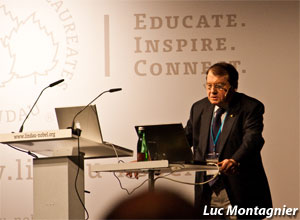« Prev Next »
 1. INFINITESIMALS: EXCUSE ME DOCTOR, DNA IS CALLING ON LINE ONE.
1. INFINITESIMALS: EXCUSE ME DOCTOR, DNA IS CALLING ON LINE ONE.
The decades-long dispute between Luc Montagnier of the Pasteur Institute in France and Robert Gallo, then at the National Cancer Institute in the US, has taken on an entirely different complexion following Montagnier's public disclosure last month of far-out homeopathic convictions. What's New reviewed homeopathy two weeks ago. Often described as treatment with "highly dilute" medicine, homeopathic dilution typically far exceeds the dilution limit, beyond which not a single molecule of the solute would remain. In homeopathy, less is more. Samuel Hahnemann, the founder of homeopathy, called this The Law of Infinitesimals. Luc Montagnier was awarded the 2008 Nobel Prize in Medicine for his discovery of human immunodeficiency virus (HIV), while Robert Gallo who many thought had a legitimate claim to the discovery was left out in the cold. Interviewed by Martin Enserink for Science just a month ago (Science 330, 1732), Luc Montagnier explained he is leaving France for Shanghai to escape the climate of fear surrounding mention of the electromagnetic waves that he claims emanate from highly diluted DNA of various pathogens, including those responsible for autism and Alzheimer's. Jaques Benveniste, who Montagnier calls a "modern Galileo," made similar claims. Others in Europe are afraid to publish similar results according to Montgnier, "because of the intellectual terror from people who don't understand it."
2. BENVENISTE: THE ONLY SCIENTIST TO WIN TWO IG NOBEL PRIZES.
My personal encounter with Jaques Benveniste is described in "The Barbary Duck," Chapter 9 of Superstition: Belief in the Age of Science (Princeton, 2008). I met with Benveniste in 1999 to discuss a protocol for a test of his claim that he could record the EM signals emanating from a homeopathic solution and transmit it over the Internet to activate homeopathic properties in a remote receptacle of water. Although the agreed-upon test was described in Time magazine, Jacques repeatedly asked for more time to prepare. He died seven years later, to avoid going through with the test, or perhaps he inadvertently sipped distilled water and died of a homeopathic overdose. Benveniste's company, Boiron, apparently scrapped plans to deliver their product electronically. They may be on to something: The remote water would indeed be just as effective as other homeopathic medicine in treating disease.
3. WI-FI: MORE ON THE AWESOME POWER OF NOTHING.
According to a story in the Albuquerque Journal, a Santa Fe resident is taking the city and AT&T to court over Wi-Fi signal upgrades. He says he suffers from electromagnetic hypersensitivity. It causes him insomnia, irritability, eye pain, dizziness, nausea, and headaches, and I have the same reaction from just writing about it. Meanwhile, however, a study by the name of COSMOS (Cohort Study of Mobile Communications) has been underway in Europe for more than a year. If it's anything like all the other significant studies, it will find nothing and Devra Davis will simply add a few more years to her estimate of the latency period for brain cancer.
Image Credit: Bastian Greshake (via Flickr)






















